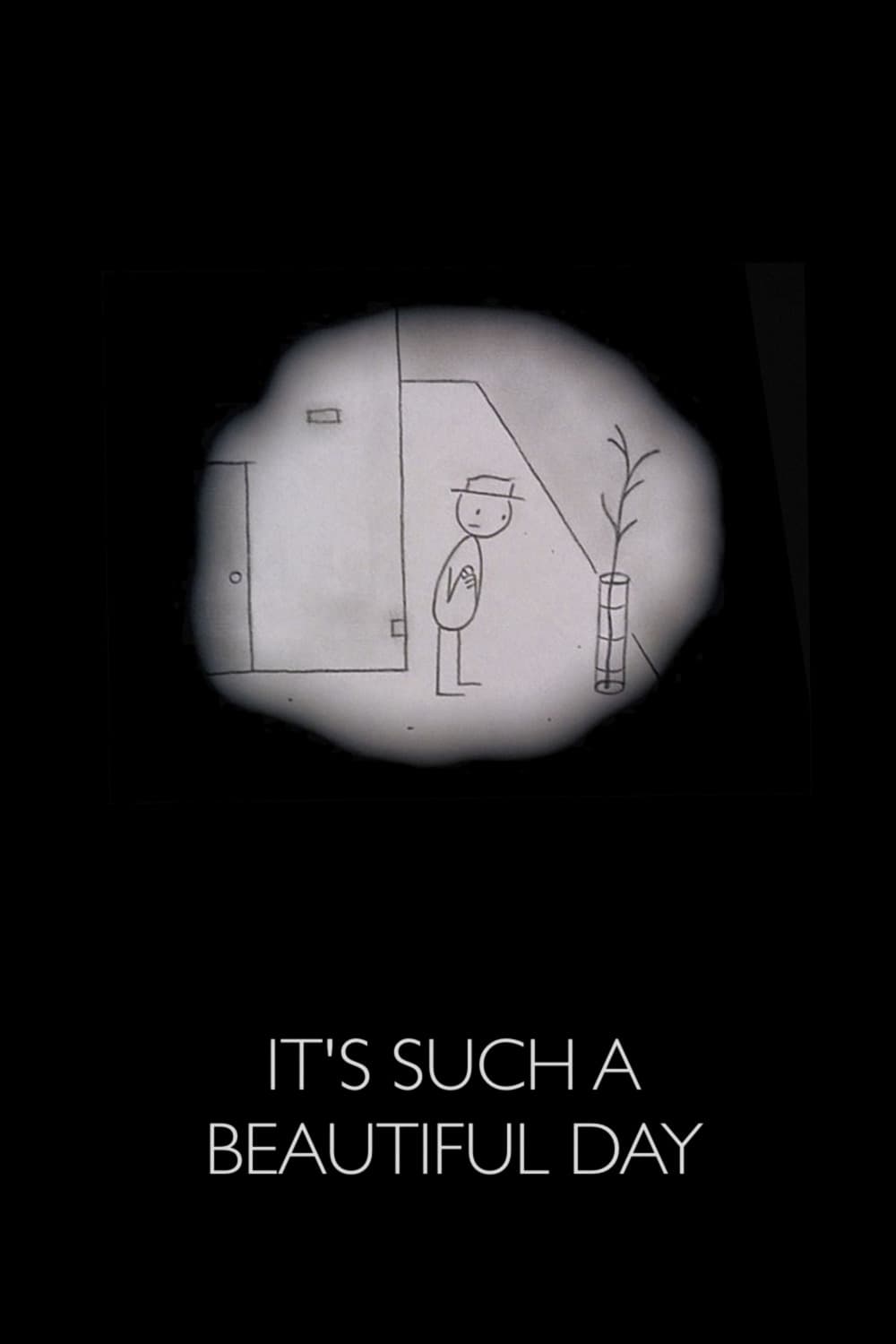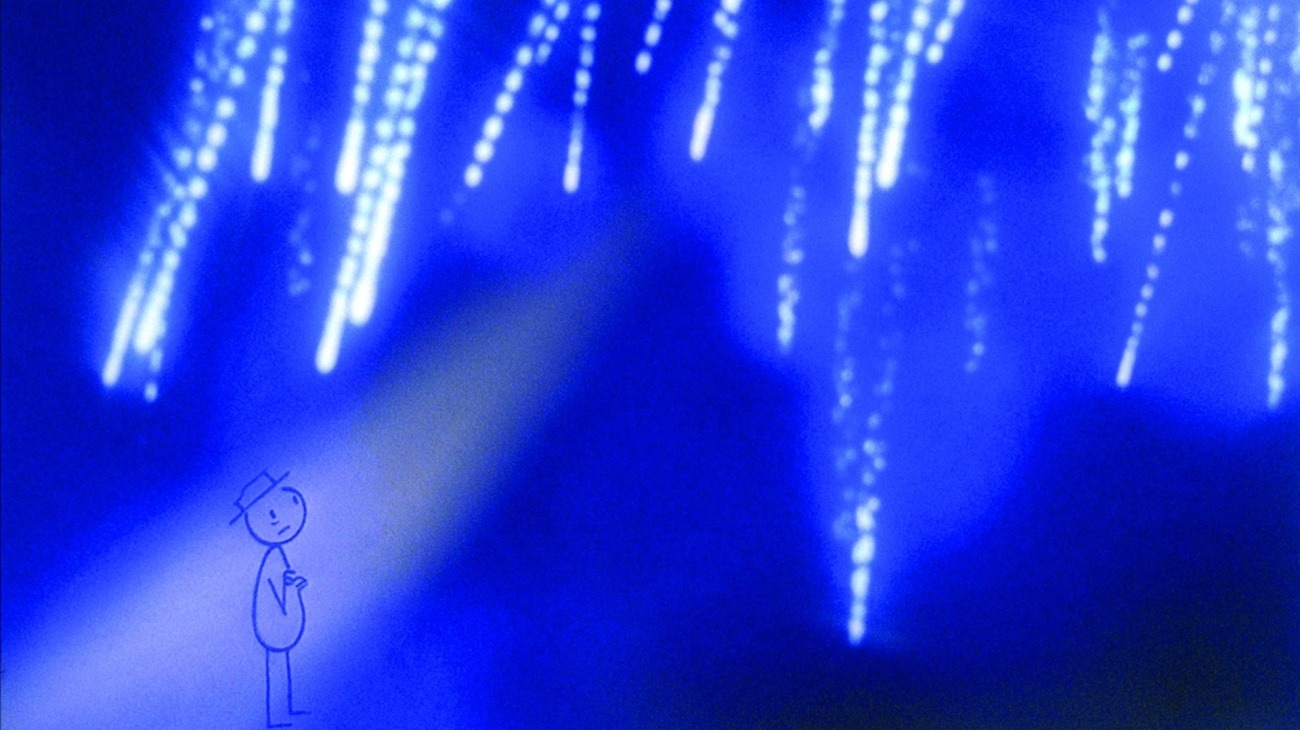
Oh no, Mister Bill
It's more than debatable that It's Such a Beautiful Day is really a 2012 film at all: it is an anthology film of sorts, stitched invisibly together from three films that independent animator Don Hertzfeldt has made over the last six years: 2006's Everything Will Be OK, 2008's I Am So Proud of You, and 2011's It's Such a Beautiful Day, the longest and most complex of the three at 23 minutes. The feature built out of those three parts thus lacks anything "new"; but the experience of watching them all in one smooth stream is nothing shy of a revelation: individually, all of the shorts are terrific, mordant dramas with a spike of pitch-black humor and ingenious low-fi filmmaking technique; combined into one thing, It's Such a Beautiful Day is one of the great pieces of animation in years, a vast, unsettling study of the human being's fragile mind and self-identity, bitterly amusing without coming at all close to justifying itself as a "comedy", full of thematic echoes and visual overlaps that aren't obvious when the films are viewed individually, but land like thunderbolts in this new form. It's one of the most philosophically and narratively complex films of the year, no small feat for a movie that clocks in at a regal 62 minutes that doesn't seem half long enough to account for the sheer amount of content here: but that, maybe, is what happens when a film is made such such merciless simplicity and spareness as this: every word and every gesture is so much more loaded, that it takes fewer of them to communicate.
The film, with virtually no human speech heard outside of the clincal, somewhat wry voice of a narrator played by Hertzfeldt himself, is the story of a middle-aged man named Bill, and it is exclusively through his perspective that we experience that story. This is more daunting than it sounds, because Bill, at the time we meet him, is a sick man, undergoing treatment - the exact nature of his illness is never actually specified, though there are whispers of a family history of schizophrenia - and the treatment has left it extremely hard for him to keep track of his memories, and to distinguish reality from hallucination. It's Such a Beautiful Day, then, is the visual representation, in mixed media, of Bill's constant sense of imbalance within the world, using him as an extreme example to study the much universal questions of Why are we here and What is all of this leading to and How can we be happy when we know that we're going to die someday?
Pretty weighty stuff for a movie whose main character is a simple-unto-primitive line figure wearing a hat (he's not, strictly speaking, a stick figure, in that his abdomen is an oval, but that's the only difference). Of course, as devotees of Hertzfeldt's very particular aesthetic have known all the way back to his career-making Rejected from 2000 (itself one of the most important pieces of American animation in the last couple of decades), the director's use of the most basic, scrawling style is at the very heart of why his films work so well: unlike more polished, detailed, or stylised cartoons, the very simplicity of Hertzfeldt's art, not unlike the studied cleanliness of a comic strip like Peanuts, allows the viewer to read into the images whatever they want, to overlay with their own thoughts and meanings. Bill is such a basic slip of a thing, just a handful of penciled lines on a white sheet, that he can stand in for any of us as needed.
And that is exactly what he does over the course of It's Such a Beautiful Day, which goes in non-sequential order from the first flickerings of real memory at three or for years of age to death and what happens to the consciousness after death, though the film itself is flexible enough in how it depicts things that it doesn't come across as schematic as all that: we have good reason to doubt that most of what we see "actually" happens, and of course the archness of the presentation never lets us forget that this is all a made-up cartoon about a chubby stick figure in a hat, in the first place, and none of it "actually" happens. That, too, is part of Hertzfeldt's genius: on one hand, he insists on the artifice of his film, and on the other uses that artifice in service of a heartbreaking study of one man's confused inability to fight his fate that feels anything but artificial.
Part of what makes the film so involving lies in the animator's skill at capturing feelings in swift, brief strokes: the faces and bodies on display are so simple that we read emotion out of their expressions or surprisingly nuanced movements more readily than we would do if faced with an actor. Part of it also lies in the film's sprawling, complex series of visuals surrounding the animated action - literally surrounding it, as Hertzfeldt frequently breaks the film into miniature frames (thus making it an exercise in self-aware watching: we're somehow keenly aware of what element within the whole picture we're choosing to look at), and almost as frequently fills the black space around those frames with abstract or experimental imagery which evokes the mood of the story in that moment in an intuitive, suggestive way, rather than a descriptive, leading way. Flames, blue skies full of shooting stars, an extremely shocking intrusion of live-action footage: all of them are used to guide us into the material without bludgeoning us.
The whole thing, simply put, is as emotionally moving as any movie I've seen in 2012, and as cunning in the way it pushes us towards those emotions without ever once feeling overtly manipulative, saccharine, or punishing. Early on, Bill reflects that while he thinks of time spent brushing his teeth or cleaning or otherwise going about daily routine as time "wasted", that's actually what his entire life is about, and exceptional moments are the weird disruptions. That is the ethos of It's Such a Beautiful Day as a whole: a film the pays considerable respect to both the routine and the disruptions in turn, and depicts with compassion, terror, and beauty the point where the two converge. It is surely Hertzfeldt's masterpiece - and I say that as someone convinced that nothing would top Rejected in my esteem - but more than that, it is one of the year's great films about the act of living.
The film, with virtually no human speech heard outside of the clincal, somewhat wry voice of a narrator played by Hertzfeldt himself, is the story of a middle-aged man named Bill, and it is exclusively through his perspective that we experience that story. This is more daunting than it sounds, because Bill, at the time we meet him, is a sick man, undergoing treatment - the exact nature of his illness is never actually specified, though there are whispers of a family history of schizophrenia - and the treatment has left it extremely hard for him to keep track of his memories, and to distinguish reality from hallucination. It's Such a Beautiful Day, then, is the visual representation, in mixed media, of Bill's constant sense of imbalance within the world, using him as an extreme example to study the much universal questions of Why are we here and What is all of this leading to and How can we be happy when we know that we're going to die someday?
Pretty weighty stuff for a movie whose main character is a simple-unto-primitive line figure wearing a hat (he's not, strictly speaking, a stick figure, in that his abdomen is an oval, but that's the only difference). Of course, as devotees of Hertzfeldt's very particular aesthetic have known all the way back to his career-making Rejected from 2000 (itself one of the most important pieces of American animation in the last couple of decades), the director's use of the most basic, scrawling style is at the very heart of why his films work so well: unlike more polished, detailed, or stylised cartoons, the very simplicity of Hertzfeldt's art, not unlike the studied cleanliness of a comic strip like Peanuts, allows the viewer to read into the images whatever they want, to overlay with their own thoughts and meanings. Bill is such a basic slip of a thing, just a handful of penciled lines on a white sheet, that he can stand in for any of us as needed.
And that is exactly what he does over the course of It's Such a Beautiful Day, which goes in non-sequential order from the first flickerings of real memory at three or for years of age to death and what happens to the consciousness after death, though the film itself is flexible enough in how it depicts things that it doesn't come across as schematic as all that: we have good reason to doubt that most of what we see "actually" happens, and of course the archness of the presentation never lets us forget that this is all a made-up cartoon about a chubby stick figure in a hat, in the first place, and none of it "actually" happens. That, too, is part of Hertzfeldt's genius: on one hand, he insists on the artifice of his film, and on the other uses that artifice in service of a heartbreaking study of one man's confused inability to fight his fate that feels anything but artificial.
Part of what makes the film so involving lies in the animator's skill at capturing feelings in swift, brief strokes: the faces and bodies on display are so simple that we read emotion out of their expressions or surprisingly nuanced movements more readily than we would do if faced with an actor. Part of it also lies in the film's sprawling, complex series of visuals surrounding the animated action - literally surrounding it, as Hertzfeldt frequently breaks the film into miniature frames (thus making it an exercise in self-aware watching: we're somehow keenly aware of what element within the whole picture we're choosing to look at), and almost as frequently fills the black space around those frames with abstract or experimental imagery which evokes the mood of the story in that moment in an intuitive, suggestive way, rather than a descriptive, leading way. Flames, blue skies full of shooting stars, an extremely shocking intrusion of live-action footage: all of them are used to guide us into the material without bludgeoning us.
The whole thing, simply put, is as emotionally moving as any movie I've seen in 2012, and as cunning in the way it pushes us towards those emotions without ever once feeling overtly manipulative, saccharine, or punishing. Early on, Bill reflects that while he thinks of time spent brushing his teeth or cleaning or otherwise going about daily routine as time "wasted", that's actually what his entire life is about, and exceptional moments are the weird disruptions. That is the ethos of It's Such a Beautiful Day as a whole: a film the pays considerable respect to both the routine and the disruptions in turn, and depicts with compassion, terror, and beauty the point where the two converge. It is surely Hertzfeldt's masterpiece - and I say that as someone convinced that nothing would top Rejected in my esteem - but more than that, it is one of the year's great films about the act of living.






